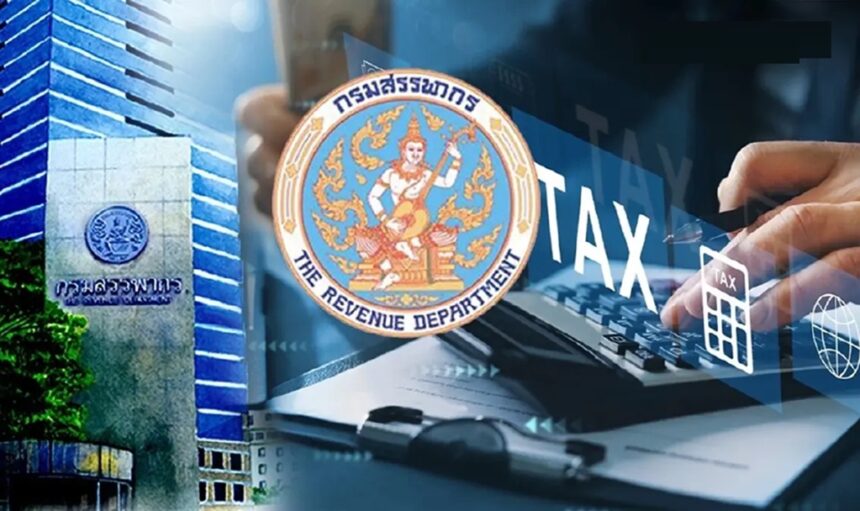BANGKOK – Thailand’s Revenue Department is moving quickly to roll out new tax laws that will exempt Thai tax residents from paying personal income tax on money earned abroad. Officials aim to have the changes in place by 2025.
This move comes shortly after the Cabinet approved a Finance Ministry plan to drop the personal income tax on profits from digital assets and cryptocurrency trading.
Together, these updates mark a big shift in how Thailand handles taxes and are set to make the country more attractive for both residents and the growing group of expatriates, especially in popular areas like Chiang Rai, Chiang Mai, and Phuket, where digital nomads and investors settle.
Foreign Income Tax Exemption Changes the Rules for Residents
The new tax plans follow rules set in 2024 that required anyone living in Thailand for 180 days or more per year to pay tax on any money sent into Thailand from abroad. Many saw this law as a barrier, keeping investors and wealthy individuals from bringing money into the country.
Reports from the Bangkok Post point out that the upcoming changes, set to be confirmed by royal decree or government regulation, will let tax residents bring in foreign earnings tax-free as long as they do so within two tax years of earning the money.
This change could encourage Thai citizens to return large amounts of overseas funds, with estimates suggesting up to 2 trillion baht ($58.8 billion) could flow back. Finance Minister Pichai Chunhavajira says these moves will help boost investment at home and support economic growth.
The Revenue Department’s Panuwat Luengwilai highlighted the need for tax clarity and a push for more money to enter the Thai economy, helping address the downsides of the previous 2024 law.
What the Reforms Mean for Foreigners in Thailand
Foreigners living in Thailand—including retirees, digital professionals, and skilled workers—stand to benefit from the new rules. Those holding Long-Term Resident (LTR) or Thailand Privilege Visas will feel the effects most. At present, income from overseas, including crypto gains, is taxed if it is brought into Thailand in the year it is made.
Under the new exemption, expatriates can bring in profits like investment returns, pensions, or business income without tax if the money arrives in the following tax year. For example, a retiree in Chiang Rai who sells property overseas in 2025 could transfer those funds in 2026 and avoid Thai tax, provided the new law passes.
LTR visa holders already receive tax breaks for foreign income earned before 2024, and the proposed changes follow rules in Section 41 of the Thai Revenue Code. That means both Thai citizens and expatriates who meet the 180-day rule will be treated the same when it comes to tax.
Still, the Revenue Department reminds everyone to submit tax returns by the deadlines (March 31 for paper filings, April 8 for online returns) to avoid late penalties, especially now that Thailand uses OECD’s Common Reporting Standards (CRS) to track overseas funds.
Record-keeping will be vital under the new policy. Foreigners must keep detailed records of where income comes from and when it is transferred to Thailand. As Thai tax officials can now access cross-border financial data through CRS, any missing or undeclared income might lead to audits or legal trouble—a point that many members of Chiang Rai’s expat community are already taking seriously.
Crypto Profits Now Tax-Free on Regulated Platforms
Thailand’s Cabinet agreed on June 17, 2025, to back the Finance Ministry’s plan to scrap personal income tax on crypto and digital asset profits from trades made on officially regulated exchanges. Between January 1, 2025, and December 31, 2029, investors will enjoy a five-year break from the previous 15 percent tax on crypto earnings.
Deputy Finance Minister Julapun Amornvivat called this a key step as Thailand moves to be a top destination for digital asset investors. The government expects the policy to increase economic activity and raise over 1 billion baht ($30.7 million) in tax from new businesses during this period.
Now, both Thais and foreign residents can keep all profits from trading cryptocurrencies like Bitcoin and Ethereum on licensed exchanges such as Bitkub, Zipmex, or KuCoin’s local branch. Trading on unregistered platforms, like Bybit and OKX, is still banned, with enforcement starting June 28, 2025.
Chiang Rai’s growing Web3 community is likely to see a boost from these changes. Blockon Ventures’ founder Jagdish Pandya predicts that digital asset holdings in Thailand could reach $1 trillion by 2030, thanks to these forward-thinking policies in places like Chiang Mai and Phuket. The new tax break adds to earlier updates, including a 2024 VAT waiver for digital asset trading and the 2023 scrapping of double taxation on investment tokens, giving Thailand an edge over countries like Japan and South Korea.
Looking at the Economy and Regulations
With these tax changes, Thailand is seeking to support new technology and attract investment while keeping strong oversight. The Revenue Department is working with international standards like the OECD’s Crypto-Asset Reporting Framework (CARF) and anti-money laundering rules set by the Financial Action Task Force (FATF). These measures aim to stop tax evasion and guide both locals and expats to use approved systems.
Although the government expects to lose about 100 million baht ($3.07 million) in tax revenues short term because of the crypto exemption, officials predict bigger long-term gains from more trading, investment, and blockchain-related business.
The Finance Ministry is also looking into a value-added tax (VAT) for digital asset sales to help balance the budget and integrate crypto further into Thailand’s economic system.
Thailand’s new tax approach opens up fresh opportunities for both Thai nationals and foreign residents. With the chance to bring in foreign earnings and trade crypto without tax, Thailand becomes an even more attractive place to settle and invest long-term.
Yet the focus on regulated exchanges and global data reporting means everyone must pay close attention to staying in line with the rules.
The Revenue Department’s fast pace in rolling out these changes, together with the crypto tax break, reflects a modern, forward-looking policy.
With the new rules set to take effect in 2025, Thailand is set to draw more investors and residents, reinforcing its spot as a key financial and tech centre. Both locals and expats are encouraged to work with tax experts and watch for the final law details to make the most of these reforms.
Related News:
Thailand’s Revenue Department Warns Online Workers About Paying Tax














